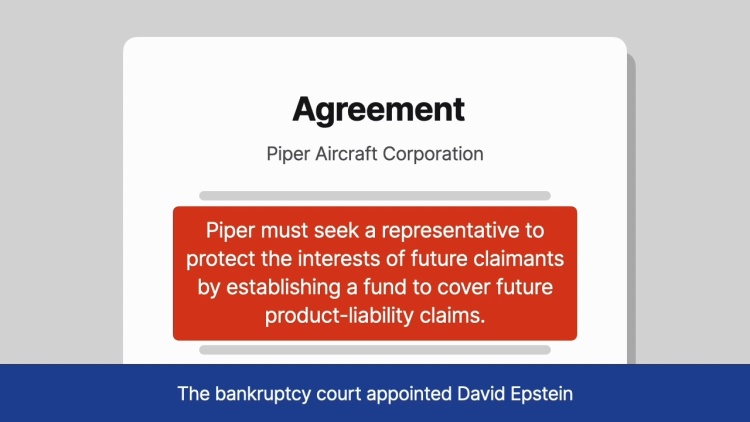In re Piper Aircraft
United States Court of Appeals for the Eleventh Circuit
58 F.3d 1573 (1995)

- Written by Denise McGimsey, JD
Facts
In 1991, Piper Aircraft Corporation (Piper) (defendant), which had been in business since 1937, filed for reorganization under Chapter 11. In April 1993, in accordance with Piper’s proposed reorganization plan, Piper and Pilatus Aircraft Limited (Pilatus) executed a letter of intent setting forth Pilatus’s purchase of Piper’s assets. Among other things, the deal required Piper to request the appointment of a representative of future claimants (the Future Claimants) in order to establish a bucket of funds for the payment of future product liability claims. The bankruptcy court appointed David Epstein (plaintiff) as the representative for Future Claimants, which the court broadly defined to include all persons, whether identified or not, who would assert post–plan confirmation claims based upon or related to products made, sold, designed, or distributed by Piper prior to plan confirmation. The court’s definition of Future Claimants expressly stated that it was not a determination of whether such claimants could hold “claims” against Piper under 11 U.S.C. § 101(5). On behalf of the Future Claimants, Epstein filed a proof of claim in an amount close to $100 million. The size of the claim was predicated upon statistical assumptions. Piper and the Official Committee of Unsecured Creditors (defendant) objected. The bankruptcy court disallowed the proof of claim because no prepetition relationship between the Future Claimants and Piper was established. The district court affirmed. Epstein appealed.
Rule of Law
Issue
Holding and Reasoning (Black, J.)
What to do next…
Here's why 907,000 law students have relied on our case briefs:
- Written by law professors and practitioners, not other law students. 47,100 briefs, keyed to 996 casebooks. Top-notch customer support.
- The right amount of information, includes the facts, issues, rule of law, holding and reasoning, and any concurrences and dissents.
- Access in your classes, works on your mobile and tablet. Massive library of related video lessons and high quality multiple-choice questions.
- Easy to use, uniform format for every case brief. Written in plain English, not in legalese. Our briefs summarize and simplify; they don’t just repeat the court’s language.





